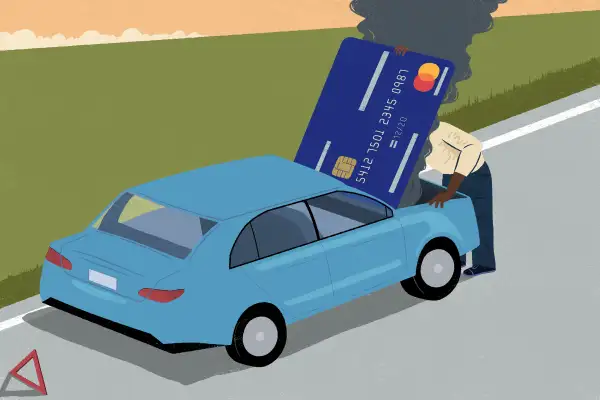Rental Car Insurance: What Your Credit Card Covers — and What It Doesn't

Every time you rent a car, you can be sure that a representative will ask you if you'd like to purchase their optional insurance. The coverage they offer typically costs between $10 and $30 a day — the equivalent of paying an annual rate of up to $10,000 or more.
Thankfully, some credit cards offer a form of rental car insurance, but it's important to know the details before you decline the optional coverage.
What credit card rental car insurance covers
When you rent a car, you are taking risks that you could owe someone money, either because you damaged the rental car itself or because you were at fault in a collision with a third party.
First, let's look at just the prospect of theft or damage to the rental car itself. To protect it's own property, your rental car company will require you to have insurance to cover damage to the vehicle, whether it's provided by your personal motor vehicle policy or your credit card. Otherwise you'll have to purchase their expensive policy. You could rely on personal vehicle insurance policy, as it may cover theft or damage of your rental car, but you should talk to your insurance company to be sure you have this coverage.
Credit card rental car insurance and deductibles
Nevertheless, making a claim on your personal insurance can result in higher rates, and the payment of a large deductible. For example, many drivers have a $1,000 deductible on their personal car insurance policies. To protect you from having to pay the deductible of your personal insurance, it's great to have additional rental car insurance, either purchased from the rental car company or as benefit from your credit card, even if you have a personal policy. And if you have a credit card that offers primary rental car insurance, then you wouldn't even have to make a claim against your personal policy, possibly saving you from higher premiums.
Do credit cards offer liability insurance?
Then there's the issue of what happens when you're driving a rental car and you're responsible for damaging another vehicle and possibly injuring its occupants. To cover these losses, you would need third party liability insurance, which isn't a benefit of any credit card. Without third-party liability insurance, you could be liable for damages if you were sued by the other driver and its occupants. However, this coverage may be part of your personal vehicle policy or it can usually be purchased from the rental car company. However, rental car companies offer this policy separately from their theft and damage policies, and you'll have to pay even more for it.
How can you tell if your credit card has got you covered
Until just a few years ago, nearly every credit card came standard with rental car insurance. But one by one, many major credit card issuers began slashing its cardholder benefits over the last few years, including the once common car rental insurance.
The best way to tell if your credit card still offers rental car insurance is to look at a document called the "Guide to Benefits." This is a usually included as a pamphlet that's mailed with the card, and it's updated from time to time. Some card issuers also offer a digital version on their web sites. If you can't find the latest version online, it's not a bad idea to call your credit card issuer to verify that you have the latest copy.
How to be sure that you're insured
With the rental car insurance provided by some credit cards, you have to be very careful to comply with all the rules and limitations. First, all credit cards that offer rental car insurance require you to use your card to pay for rental. You can use a discount coupon and still be insured, but you can't pay for your rental with airline miles, hotel points or credit card rewards, and then just pay for some amount of taxes and fees with a credit card, and still be insured by its policy.
What isn't covered
Next, you need to be sure to comply with the terms of the rental agreement, as violating it will void your insurance. The fine print of your rental contract will forbit obvious stuff, like using the car to commit a crime, but will also prohibit less obvious things like using the vehicle for commercial purposes or driving on unpaved roads. The terms of your credit card rental insurance will typically exclude many vehicles such as expensive luxury cars, antiques, large trucks and full size passenger vans. A credit card's rental car insurance terms may also have territorial restrictions that limit the coverage of vehicles rented in some countries. For example. the auto rental insurance offered by many American Express cards excludes vehicles rented in Italy, Australia and New Zealand.
Rental car insurance if you don't own a car
You should also understand the difference between the theft and damage insurance offered by your credit card, and liability coverage that isn't. If your car is stolen, or you get in an accident, your credit card policy will only cover losses up to the value of your rental car. If you're involved in a collision with another vehicle, your credit card policy doesn't include liability insurance, which means that it won't cover any damage to the other car, or injuries to the occupants. This is why you should have a personal insurance policy that covers liability, or pay extra for liability coverage offered by the car rental company.
What are primary and secondary insurance?
Lastly, you should understand the difference between primary and secondary insurance. Many credit cards offer secondary insurance, which requires you to first submit a claim with your insurance company, if you have private motor vehicle insurance. Only then would the credit card issuer cover any remaining losses. But if you have a credit card with primary rental car insurance, you can just submit your claim directly to the credit card's benefits administrator.
More on Car Insurance
Money’s Top Picks
Car Insurance Reviews Learn More |
